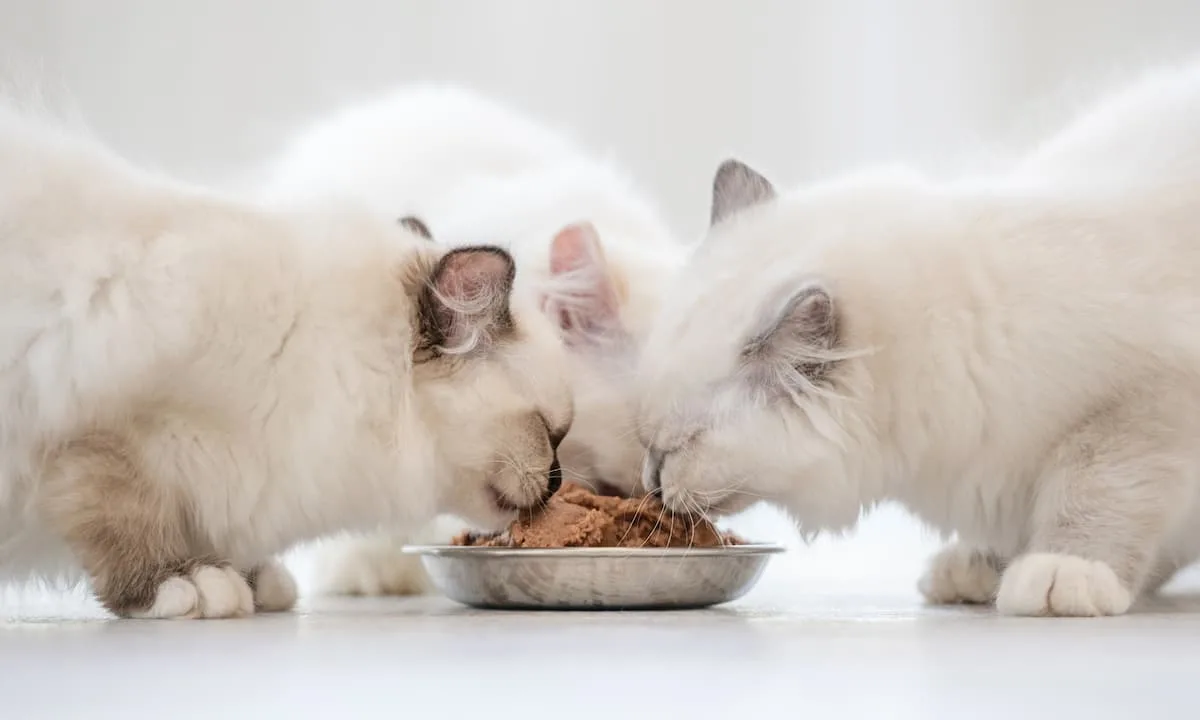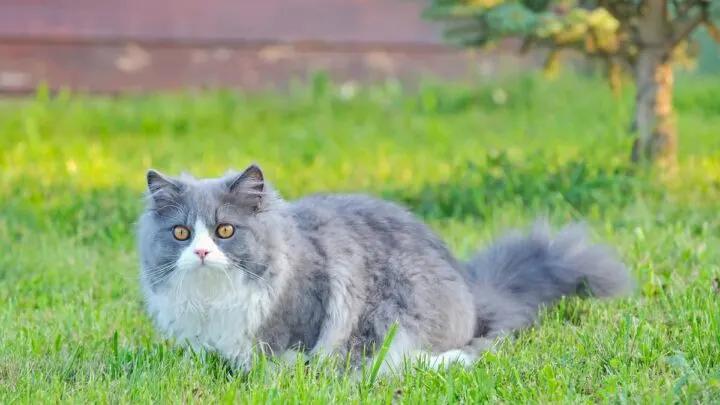A ragdoll is a cat breed that has shiny blue eyes and generally craves more affection and care. Ragdoll owners are constantly worried about their eating, the quantity of food, and so on. If you’re searching for the same answer, you’ve come to the right place wherein we’ll answer: how much should a Ragdoll cat eat?
Ragdoll cats should be fed with ½ or ¾ can of wet food per day. While a male Ragdoll needs about 350 calories in a day, a female requires 250 calories for optimal feeding.
We’ll be looking at the quantity and the type of food a ragdoll should be fed with. Which food type is best for them, should they be given a special diet, can ragdolls consume raw meat? We’ll be covering all these topics and much more.

How Many Calories Should My Ragdoll Cat Eat
People get confused about how much calorie intake should be given to their ragdoll kittens and grown cats. Well, here is the answer you all are looking for.
According to the national research council, you should start by giving 200 kcal to your cats and then slowly increase the calorie amount to 250-280 kcal per day. But if your ragdoll breed is quite grown up and weighs up to 15 pounds, then, in that case, it may require a daily intake of at least 360 kcal.
Below is a feeding chart for Ragdoll cats listed by weight:
| Weight | Daily kcal intake |
| 2 – 3 lbs | 160 – 230 kcal/day |
| 4 – 5 lbs | 270 – 330 kcal/day |
| 6 – 7 lbs | 370 – 420 kcal/day |
| 8 – 9 lbs | 450 – 500 kcal/day |
| 10 lbs+ | 550 kcal/day |
Do Ragdolls Need A Special Diet
As the ragdolls’ owners might know that this breed is carnivores, it is highly recommended to offer them a lot of meat and proteins specially made for animals. This is the diet they require to grow and develop into big, healthy cats.
However, they can eat a vegetarian diet too, but meat and proteins are recommended for their quick growth.
Essential amino acids, which include taurine, are essential for cats, but they are unable to synthesize them. Animal protein plays a huge role here, as cats get taurine through this protein. However, you should be cautious while choosing the protein; the market offers two kinds of proteins, plant and animal. Only animal protein is recommended for ragdolls.
Do Ragdolls Have Sensitive Stomachs
Usually, cats have digestive issues which get cleared up within a few days. As for the ragdoll breed, it is highly susceptible to digestive problems.
Ragdolls are predisposed to several chronic digestive issues. Hence they are prone to diarrhea. As to answer this question whether they have sensitive stomachs or not- yes, ragdolls have a sensitive stomach, and they should be kept under supervision.
Their daily diet should be monitored to avoid such digestive problems. Ragdolls’ diets should be kept under a daily check.
What Food Is Best For Ragdoll Cats
The ragdolls require a diet that is full of proteins and vitamins. This diet is essential to keep the ragdoll cat fit and healthy.
They require meat, too, as they are a carnivore’s breed. Zero cereal content food should be given to them.
You must follow a particular diet plan for them and follow it throughout if you wish your cat to develop and thrive.

Should I Prefer Wet Or Dry Food For My Ragdoll
The breeders and the owners of this particular breed, ragdolls, are convinced that it is a wet food that makes them happy.
Wet food is a crucial part of the ragdoll’s diet, and cats love to consume wet food. It is smelly (In a good way) And easy to eat, which suggests why the cats love it!
However, this does not mean that you shouldn’t give them dry food. Dry food is equally essential for their diet and health. But if your cat is acting moody today, you can try wet food!
Can Ragdolls Eat Raw Meat
Yes, you can very well feed your ragdoll with raw meat. It’s one of their favorite diets, and it also helps keep them hydrated because raw meat is moistened.
Raw meat also fulfills their protein requirement as we all know that meat has a high quantity of proteins in it.
Are There Any Dietary Restrictions For Ragdolls
Here’s a list of things that you should avoid for your ragdoll-:
- Artificial additives (Colors, flavors, preservatives)
- High carbohydrate food products
- Pulses (beans, peas, and chickpeas)
- Poultry by-product meal
- Corn
- Wheat
- Soy
These are the things that you should take care of. These can harm your cat’s health. These are the dietary restrictions recommended by cat breeders and owners of the ragdoll breed.
They state that these food products will cause harm to the ragdoll and will play with the health and fitness of the cat.
Things To Consider
For your better and good knowledge, we’ll go through a quick recap for all the above-stated points:
- A ragdoll should at least eat ½ or ¾ can of wet food daily. It is essential for its rapid growth and overall development.
- The calorie consumption for a ragdoll should be about 250 kcal for the kittens or cats who have turned six months old. However, as the cat grows old, the calorie intake should be increased from 250 kcal to almost 280 kcal per day.
- Some cats, which weigh around 15 pounds, may require up to 360 kcal daily.
- Ragdolls don’t need a special diet except for the fact that they are carnivores and should be given proper meat and animal proteins.
- Ragdolls usually have a sensitive stomach because of their predisposition towards digestive issues; hence their diet should be kept in check always.
- Wet food is considered to be the best food for these cats with shining blue eyes and soft fur. However, they should be given dry food, too, as it will help them to thrive.
- Wet food should be prioritized because ragdolls love it, and wet food makes them really happy.
- Ragdolls can eat raw meat as a part of their diet as it fulfills the protein requirement for these cats. As a carnivore’s breed, ragdolls are bound to enjoy this as part of their diet.
- However, there are some dietary restrictions for these beautiful cats; they must not be offered any kind of pulses or food full of carbohydrates.
- They should also be restricted from eating non-nutritive fillers. They should avoid any kind of flavors, colors, or preservatives.

My name is James, and welcome to FAQCats!
Along with our team of cat owners, expert pet enthusiasts, and pet professionals, we aim to write engaging helpful, engaging content about cats. At FAQCats we strive to provide content that’s accurate and fun to read. Our team writes about everything related to cats; even the most complex of topics. Through extensive research and caring for our own fur-pals, we’re able to provide something cat owners worldwide will love. Have a look around, and leave us feedback anytime!

